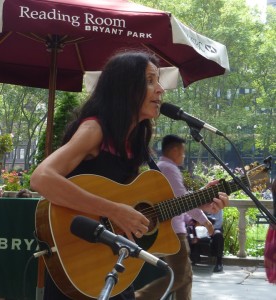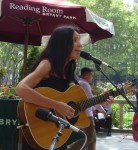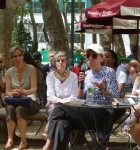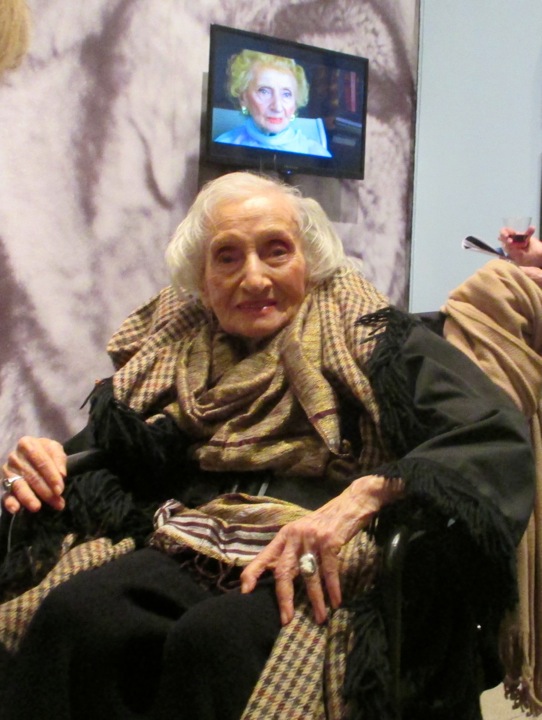Suzzy Roche’s Sensitive Reading of Edith Wharton
 Kyle and I took the bus to Bryant Park yesterday to hear singer, musician and novelist Suzzy Roche* lead a discussion of Edith Wharton’s House of Mirth in the Park’s long-running Reading Room series. We arrived just in time to corral two chairs near the front of the outdoor space and settled in as Suzzy was tuning her guitar for what would later be an original song to close the program. Suzzy began by sharing some notes and interesting facts she had learned about Wharton.
Kyle and I took the bus to Bryant Park yesterday to hear singer, musician and novelist Suzzy Roche* lead a discussion of Edith Wharton’s House of Mirth in the Park’s long-running Reading Room series. We arrived just in time to corral two chairs near the front of the outdoor space and settled in as Suzzy was tuning her guitar for what would later be an original song to close the program. Suzzy began by sharing some notes and interesting facts she had learned about Wharton.
She said that 2012 marks the 150th year since Wharton’s birth in to a wealthy family in New York City. The family name was Jones, and some believe their conspicuous upper-class status may be the origin of the phrase “keeping up with the Joneses.” Early on, Edith’s mother forbade her from reading novels, lest her daughter’s intellect expand in ways that would make it harder to ensure a proper marriage for her. Suzzy reminded everyone how fitting it was to be in Bryant Park with a view of the main branch of the New York Public Library, since the novel we were discussing includes a scene set in the lovely park. From her youthful days, Wharton exhibited a high degree of sensitivity, and Suzzy read a quote she found in Wharton’s autobiography: “The owning of my first dog woke in me the long ache of pity for animals and for all inarticulate beings which nothing has ever stilled.”
Wharton’s first full-length piece of fiction, a novella finished at age 18, was accompanied by several passages of self-criticism where she assessed what she judged to be the weaknesses of her own work. Suzzy quoted this early comment of Wharton’s on the subject of criticism: “After all, one knows one’s weak points so well it’s rather bewildering to have the critics overlook them and invent others.”
With these details of Wharton’s life in our minds, Suzzy turned the discussion to the novel itself. After reviewing contemporary critical reaction to the book, which often emphasized Wharton’s gender, she asked “Does this book have something to say to us right now about the place of women and money in society? She pointed out that just this year, Jonathan Franzen ignited a controversy when he wrote in the New Yorker about “Edith Wharton’s looks.” Suzzy continued that Franzen wrote “it was hard for him to warm to her novels because she had every advantage of wealth and privilege and was extremely socially conservative. But, he said, ‘she did have one potentially redeeming disadvantage: she wasn’t pretty.’ On the surface, there would seem to be no reason for a reader to sympathize with Lilly; she’s profoundly self-involved and incapable of true charity. She pridefully contrasts other women’s looks with her own. She has no intellectual life to speak of. She’s put off from pursuing her one kindred spirit because of the modesty of his income. She’s basically the worst sort of party girl, and like Wharton, she didn’t even try to be charming.” There was a gasp among the Bryant Park denizens as Suzzy read the remarks of the award-winning novelist, which, whether asserted about Wharton or Lily Bart struck many of us as chauvinistic.
As Suzzy advanced the discussion, a number of insightful comments were offered by readers sitting under the dense-leafed canopy. A woman observed that Selden, Lily’s flawed male companion, had struck her as “a nebbish who never did anything.” A man thought that the novel highlighted “the futility of human relations.” Another woman said she found that the word “love” was barely, or possibly never, uttered in the whole book. At that, Suzzy said she had been shocked when in the last sentence of the book the final word between her and Selden is actually left out of the text–a word that Lily Bart had hoped might bind her and Selden. Suzzy explained “when I finished the book I was shocked by the last sentence and the fact that the word was left out.” She also observed that for her, as a writer, she harked back to Edith’s empathy for ‘animals and inarticulate beings’ and felt it was Wharton commenting on the reality that even the most vivid word doesn’t truly go to the heart of the matter, to the level of “essence,” as Suzzy called it.
After the discussion ran its course, Suzzy picked up her Martin guitar and played a song she had composed about Wharton’s novel. It may be have even been a debut of it. The charming lyric was about language and words; she rhymed cleverly with ‘word,’ echoing and doubling such words as ‘unheard’ and ‘uttered.’ It ended with “Long ago now was written a lily/for us to expound upon willy-nilly/we can speculate, ruminate, calculate/but it still flies off/free as a bird.”
As the applause died down, the Bryant Park hosts reminded everyone who’d enjoyed the program that Suzzy’s also a novelist, the author of Wayward Saints, published by Hyperion last Spring. I read it then and loved it and made it a #FridayReads pick of mine last March. In fact, Wayward Saints was a reason I had come to Bryant Park, as much as The House of Mirth. I thought Suzzy’s novel–whose main characters are a nearly middle-aged female rocker, Mary Saint, and her mother Jean; they rediscover each other after some years apart. I loved reading Suzzy’s book. and so having also met her sister Terre earlier this summer**, I wanted to meet a second Roche sister. As Suzzy said something about her novel, I was tempted to add, “It’s great!!” but felt somehow hushed by our proximity to the NYPL.
I would close by adding a note of my own. As shown by Ruth Gruber’s interpretation of Virginia Woolf in the 1930s, in her pioneering dissertation, “Virginia Woolf: The Will to Create as a Woman,” it was extremely challenging and difficult for female writers to establish their voices at the end of the nineteenth century and early in the twentieth. I republished Ruth’s thesis, as a book in 2000, and blogged it about here. She showed that Woolf was very mindful of male critics, persevering despite it. And challenges remain today, exemplified by modern critics who don’t read Wharton’s work on its own terms. Meantime, the work of contemporary female writers is occasionally treated with disdain by critics, as chronicled recently by Andrew Summers on his blog.
* Suzzy and her sisters Maggie and Terre formed the popular trio The Roches, whose many albums over the years I’ve long enjoyed.
** Kyle and Ewan and I met Terre earlier this summer when we attended the Sunset Singing Circle in Battery Park City, which I blogged about with photos of NY Harbor. I wrote about Terre again after she published a NY Times op-ed on the new busking in the music business.









Leave a Reply
Want to join the discussion?Feel free to contribute!